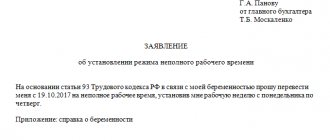The question often arises regarding the calculation of alimony arrears. Detailed answers are provided by Article 113 of the Family Code of the Russian Federation. Collection must be carried out no later than three years. The amount of debt will depend on the salary the payer receives.
Article 113 – Determination of alimony debt
In the case where there is no income, Article 113 of the Family Code provides for a payment that will be equal to the average salary. When the debtor does not provide assistance at all, then, in addition to payment, he will be required to pay a fine.
The appearance of alimony arrears
Article 113 of the RF IC regulates the following issues:
- when the claim was filed;
- what is the statute of limitations for payment;
- amount of payment;
- calculation of the total amount of debt.
Before debt collection occurs, the claim is carefully studied. It is important to understand in time when a debt arises, the reasons for its occurrence, and who is responsible for the resulting debt.
Reasons for alimony arrears
In some situations it arises from the plaintiff. In this situation, he can file a lawsuit and collect alimony for a certain time period. Article 113 of the Family Code considers the following reasons for the occurrence of debt due to the fault of the plaintiff:
- a claim for payment of assistance was not filed in court immediately after the divorce;
- the agreement on alimony payments was not drawn up and certified by a notary;
- the marriage contract does not address the issue of alimony payment;
- The plaintiff kept the writ of execution for a long time. This rarely happens; the court sends all documentation for collecting payment to the bailiff, who transfers it to the defendant at his place of residence. In some situations, the person submitting the application refuses this procedure.
Article 80 of the RF IC: responsibilities of parents for the maintenance of minor children
Art. 80 of the Family Code contains instructions on the material obligations of parents to minor children. Below - more details about its content.
Comments to Art. 80 IC RF
In addition to the obligation of maintenance, it is provided that the mother and father have the right to independently determine the procedure and form of material support for the children. The parties can differentiate and clarify the content of obligations towards the child by concluding an appropriate agreement, including regarding the payment of alimony, which must comply with the requirements set out in this code.
If the mother or father evades voluntary payment of alimony, the other party has the right to apply to the court to make an appropriate decision on forced payment.
Note! The Code provides for the possibility of the parties reaching a voluntary agreement regarding alimony payments, duly formalized and taken into account by the court when considering this issue.
In addition to spouses, representatives of the guardianship service have similar opportunities, who have the right to petition the judicial authority to assign alimony if the mother or father neglects this right.
Article 81 of the RF IC on the amount of alimony payments assigned for the maintenance of children under the age of majority, based on the results of an appeal to the court
This determines the amount of payments that must be collected as alimony for minor children. Let's consider these points in more detail.
Explanations to Art. 81 IC RF
The amount of monthly payments for alimony is determined based on the income of the parent against whom the claim has been filed with the court. The amount of money depends on the number of children, amounting to:
- with one - up to twenty-five percent;
- for two – up to thirty-three;
- for three or more – within fifty percent.
Note! The percentage of the withheld amount from the payer’s income is determined based on the number of minors that the parent must support.
The court, when determining the amount of alimony, should not strictly adhere to the prescribed restrictions. The court must make a final decision based on the financial situation of each party and the needs of the minor. As a result, the amount may be increased or decreased, depending on the circumstances surrounding the trial.
Among the circumstances taken into account, the code takes into account the reasons mentioned in Resolution of the Plenum of the Armed Forces of the Russian Federation No. 56, adopted in December 2021. A decrease or increase in the amount of alimony payments is possible if the payer or plaintiff points to the following points:
- the need to support other children under age;
- insufficient income;
- health problems that require expensive treatment or lead to loss of ability to work;
- the need for additional costs to restore the health of another minor.
In this case, the court may take into account the above circumstances, provided that their validity is confirmed by relevant documentary evidence - medical reports, doctor’s prescriptions, address certificates, birth certificates of other children and other papers.
Overdue alimony payments due to the fault of the defendant
This article of the Family Code of the Russian Federation strictly applies to a payer who is late in alimony payments or has paid insufficient amounts. A lawsuit is filed in court, and the defendant is forced to pay alimony for the entire time in the following cases:
- when the payer openly does not want to pay alimony and constantly hides from the bailiffs;
- if he deliberately understates his income;
- when the defendant constantly reduced the amount of payments, the transfer was irregular;
- The bailiffs were provided with forged documents indicating payment of alimony.
In all of the above situations, the payer will be punished not only for refusing to pay alimony, he will also be held liable in accordance with Russian legislation on forgery and concealment of income.
For refusal to pay alimony, the defendant will be punished.
The Family Code of the Russian Federation separately considers debt that arose due to a third party:
- wages were not given on time;
- alimony payments were not transferred on time from the payer’s place of work (the culprit is the accounting department);
- payment was lost during transfer by mail;
- The electronic payment was delayed and there was a serious failure at the bank.
See also:
Deprivation of parental rights and child support after such a procedure
In all these situations, a third party is considered responsible.
In some cases, alimony is not paid due to the defendant being in unforeseen circumstances:
- when he is in the territory of a natural disaster or an environmental disaster;
- if the defendant entered the occupied territory;
- the payer is located in a territory under martial law;
- the presence of the defendant in the territory that was captured by terrorists;
- the defendant suddenly became ill, was injured, was susceptible to injury, and was incapacitated for some time.
All of the above circumstances refer to force majeure. Article 113 of the Family Code of the Russian Federation considers them as grounds for excluding liability for non-payment of alimony by the payer.
Determination of the statute of limitations for alimony in Article 113 of the RF IC
The Family Code of the Russian Federation provides for a statute of limitations of no more than 3 years; for this, the following documents must be presented to the court:
- lawsuit;
- a notarized agreement on the payment of alimony;
- extracts from the court order.
From the moment a claim is filed in court, alimony will begin to be calculated. Many people mistakenly believe that alimony is calculated after a court decision appears and is presented to the defendant. This nuance must be taken into account in order to accurately determine the amount of debt.
It is best to submit an application for alimony to the court together with a claim for divorce. This way the application will be considered faster. You will start receiving help much earlier. Keep in mind that some divorces drag on, this will also take a lot of time.
Article 113 of the Family Code states that when the debt arose due to the defendant, a third party, or the plaintiff are not related to the debt, the debt will be collected from the payer not for 3 years, but for the entire period from the date of payment. When a husband and wife have made an agreement, but the spouse has not paid alimony for 5 years, the entire amount will be taken from him, and not for the three-year period.
Debt in alimony entails a large fine
The situation is considered separately when the plaintiff has not previously applied for alimony, has not entered into an agreement, but has now decided to do so and filed an application. The court will decide on debt collection for 3 years.
See also:
Escape from responsibility: how to calculate alimony debt and collect it?
Article 83 of the RF IC. Collection of alimony for minor children in a fixed amount
- In the absence of an agreement between the parents on the payment of alimony for minor children and in cases where the parent obligated to pay alimony has irregular, variable earnings and (or) other income, or if this parent receives earnings and (or) other income fully or partially in kind or in foreign currency, or if he has no earnings and (or) other income, as well as in other cases, if the collection of alimony in proportion to the earnings and (or) other income of the parent is impossible, difficult or significantly violates the interests of one of the parties, the court has the right to determine the amount of alimony collected monthly, in a fixed sum of money or simultaneously in shares (in accordance with Article 81 of this Code) and in a fixed sum of money.
- The amount of a fixed sum of money is determined by the court based on the maximum possible preservation of the child’s previous level of support, taking into account the financial and marital status of the parties and other noteworthy circumstances.
- If there are children with each of the parents, the amount of alimony from one of the parents in favor of the other, less wealthy one, is determined in a fixed sum of money, collected monthly and determined by the court in accordance with paragraph 2 of this article.
Calculation of alimony according to Article 113 of the RF IC
Determining the amount of assistance depends on many factors; the calculation is carried out by bailiffs. The plaintiff must write a statement. The calculation will depend on the type of income of the defendant, and penalties on the entire amount are also taken into account. For each overdue day - 0.5% of the total debt.
The calculation of the amount of alimony most often occurs as a percentage, it all depends on the salary the defendant receives. To determine the size, it is important to take into account all income; tax contributions are not taken. When the defendant did not receive wages for some period of time, determining the amount of wages is impossible for the reason that the enterprise was liquidated, then the average wage is taken as a basis.
When, after calculating the amount of the amount, it turns out to be too large or small, the interests of the spouses are violated, then a fixed amount is assigned. To do this you need to file an application with the court.
Article 113 of the Family Code considers the issue of 50% increased assistance for a minor child. This situation is possible when the payer refuses to fulfill his obligations and constantly evades all payments. It is subject to a 10% fee on the debt.
Determining alimony debt is a rather complex issue. The answers to this are provided by Article 113 of the Family Code of the Russian Federation. If you want to repay your debt, you must apply to the court. The main thing is to do this in a timely manner, so the issue will be resolved much faster.
Commentary on Article 81 of the RF IC
1. Shared collection of alimony, which is discussed in the commented article 81 of the Family Code of Russia, frees both the claimant and the debtor from the need to periodically apply to the court with a claim to change the amount of alimony collected in connection with a change in the debtor’s income.
2. The court may, taking into account the financial or family situation of the parties or other noteworthy circumstances, reduce or increase the amount of alimony.
The financial situation of the parties refers to the level of security of the recipient and the payer. In this case, all types of earnings or income received by these persons are taken into account; whether they have income-generating property; mandatory payments made by these persons in accordance with a court decision or for other reasons.
When we talk about marital status, we mean the presence of family members whom the potential alimony payer is required by law to support.
Other noteworthy interests of the parties usually mean the health status of the payer and recipient, their age, degree of disability, as well as other facts that the court considers sufficiently serious.






